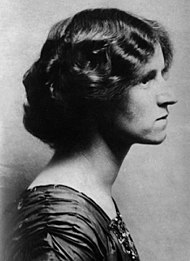Susan Sutherland Isaacs
| Susan Sutherland Isaacs | |
|---|---|

Susan Isaacs, 1910s
|
|
| Born | Susan Sutherland Fairhurst 24 May 1885 Turton, Lancashire |
| Died | 12 October 1948 (aged 63) |
| Fields | Educational psychology |
Susan Sutherland Isaacs, CBE (née Fairhurst; 24 May 1885 – 12 October 1948; also known as Ursula Wise) was a Lancashire-born educational psychologist and psychoanalyst. She published studies on the intellectual and social development of children and promoted the nursery school movement. For Isaacs, the best way for children to learn was by developing their independence. She believed that the most effective way to achieve this was through play, and that the role of adults and early educators was to guide children's play.
Isaacs was born in 1885 in Turton, Lancashire, the daughter of William Fairhurst, a journalist and Methodist lay preacher, and his wife, Miriam Sutherland. Isaacs mother died when she was six years old. Shortly afterwards she became alienated from her father after he married the nurse who had attended her mother during her illness. Aged 15, she was removed from Bolton Secondary School by her father because she had converted to atheistic socialism; her father refused to speak to her for 2 years. She stayed at home with her stepmother until she was 22. She was first apprenticed to a photographer and then she began her teaching career as a governess for an English family.
In 1907, Isaacs enrolled to train as a teacher of young children (5 to 7-year-olds) at the University of Manchester. Isaacs then transferred to a degree course and graduated in 1912 with a first class degree in Philosophy. She was awarded a scholarship at the Psychological Laboratory in Newnham College, Cambridge and gained a master's degree in 1913.
Isaacs also trained and practised as a psychoanalyst after analysis by the psychoanalyst John Carl Flugel (1884–1955). She became an associate member of the newly formed British Psychoanalytical Society in 1921, becoming a full member in 1923. She began her own practice that same year. She later underwent brief analysis with Otto Rank and in 1927 she submitted herself to further analysis with Joan Riviere, to get personal experience and understanding of Melanie Klein's new ideas on infancy. Isaacs also helped popularise the works of Klein, as well as the theories of Jean Piaget and Sigmund Freud. She was initially enthusiastic for Jean Piaget's theories on the intellectual development of young children, though she later criticised his schemas for stages of cognitive development, which were not based on the observation of the child in their natural environment, unlike her own observations at Malting House School.
...
Wikipedia
